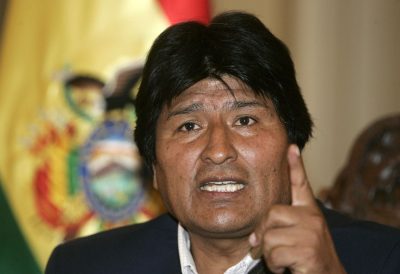By
Grégory Wilson
Bolivian President Evo Morales narrowly lost in a constitutional referendum that would have granted him and his vice-president the right to run for a fourth term.
With 99.7% of votes counted, the No vote won 51.3% to 48.7%.
“Evo called the referendum, the people voted [and] decided. What remains is for him to accept the popular vote. Fulfill his mandate,” said Samuel Doria Medina, leader of the National Unity Party on his Twitter page.
The referendum in question was to amend Article 168 of the 2009 Bolivian constitution, which allows a president and vice-president to be re-elected only once. Each mandate lasts for five years.
Morales and Vice-President Álvaro García Linera were elected in 2006. They were re-elected in 2010 and again in 2015. The Constitutional Court allowed them to run in the 2015-2020 elections claiming that their first term was during the previous constitution and so should not be counted.
Morales and Linera were aiming to run again in 2019.
The No vote won in six of the nine departments: Chuquisaca, Potosí, Santa Cruz, Tarija, Beni and Pando. The Yes vote won in La Paz, Oruro and Cochabamba.
“The voting process was both transparent and reliable. They have overcome the public’s doubts about our transparency, independence and impartiality,” said Katia Uriona, President of the Supreme Electoral Tribunal.
Uriona was referring to widespread doubts that the Yes vote would win through electoral fraud.
The constitutional referendum attracted observers from over 100 countries to Bolivia. Notably, The Union of South-American Nations (UNASUR) declared the vote count had been both “secure” and “transparent”.
However, Linera insists there was foul play.
“We would like to denounce the electoral bullying and attempted electoral fraud against rural voters of this country. This bullying is being led by the political right against voters whose votes have yet to be counted,” he said.
Despite his claim, Bolivians believe social media, and not right-wing politicians, was the decisive factor in the campaign and its outcome.
“We have not only respected our commitment to all Bolivians, we have also advanced hand-in-hand with them in the strengthening of our democracy,” said Uriona.
Evo Morales
Evo Morales first rose to power as the leader of Movement for Socialism (MAS) in December 2005 as Bolivia’s first indigenous president.
Prior to his political career, Morales was a coca farmer and union leader fighting for farmers’ right to continue cultivating the plant.
He campaigned on a promise to drastically raise the living standards of the majority indigenous population.
Morales’ first major move was to nationalize the natural gas industries in 2006. He used this newfound wealth to put his promised social programs and public works to execution. Poverty levels in Bolivia dropped 25% and extreme poverty by 43% as a result of his work.
In 2008, Morales reformed the constitution and officially renamed Bolivia as a unitary plurinational state.
The new constitution, ratified in 2009, notably reinvented land ownership, granted greater autonomy to regional governments, reformed the judiciary, and put Bolivia’s natural resources under the exclusive ownership of the Bolivian people, managed by the state. It also introduced the two-term limit for presidencies.
His initial popularity nationwide helped him win three consecutive terms. Morales’ latest term is due to end in 2020.
Current Controversies
Yet, citizens have begun worrying about controversial allegations circulating as of late.
For example, there is the case of possible collusion with the Chinese engineering firm, CAMC. Critics suspect the company is receiving preferential treatment with the state because its commercial manager in Bolivia is Morales’ ex-girlfriend, Gabriela Zapata.
In fact, Morales confirmed that he and Zapata did have a son. He added that the latter died as a baby. Moreover, he claimed that he and his ex-girlfriend had not seen each other since, but a photo of them in 2015 belied that statement.
A legislative committee was formed to investigate whether collusion is taking place or not. The body is formed of members of the governing party and of two opposition parties. It is currently in session.
Another controversy dogging Morales is the incident at El Alto on 17 February. On that day, a mob led by a former member of MAS torched the city’s town hall. Their alleged objective was to burn documents incriminating the former mayor of corruption. Six officials died as a result.
Thereafter, both the ruling party and the opposition have mutually accused one other of bearing responsibility for the attack.
Bibliography
http://correodelsur.com/politica/20160221_en-medio-de-irregularidades-bolivia-vota-para-definir-si-evo-puede-postular-en-2019.html
http://www.bbc.co.uk/news/world-latin-america-12166905
http://www.bbc.com/mundo/noticias/2016/02/160223_bolivia_referendo_resultados_all
Correo del Sur, paper edition. 24 February, 2016
http://www.bbc.com/mundo/noticias/2015/10/151030_bolivia_evo_morales_reeleccion_pregunta_az
http://abcnews.go.com/International/wireStory/scandals-dog-bolivias-evo-morales-ahead-referendum-37090894
http://m.la-razon.com/suplementos/Reportajes/quemaron-documentos-pruebas-corrupcion_0_2439356086.html
http://www.infobae.com/2016/02/22/1791943-evo-morales-culpo-las-redes-sociales-el-resultado-del-referendum-y-quiere-controlar-su-uso
https://en.m.wikipedia.org/wiki/Constitution_of_Bolivia



Thanks for the excellent article Mr. Wilson. Having worked in Bolivia as a consultant to state owned railway, I am inclined to seriously doubt Evo Morales's credibility. In my travels to Bolivia I was witness to a very high level of nepotism and cronyism. The governmental authorities in many Latin American countries do not have a solid reputation with regard to ethical and trustworthy conduct. In my opinion, there is a direct correlation between the economic success of a country and the level of corruption in the countries governing body. And we all know that Bolivia is not the most prosperous of countries, even my South American standards. Thankfully, the people were wise enough to reject the constitutional reform that would have granted Morales a fourth term in office.